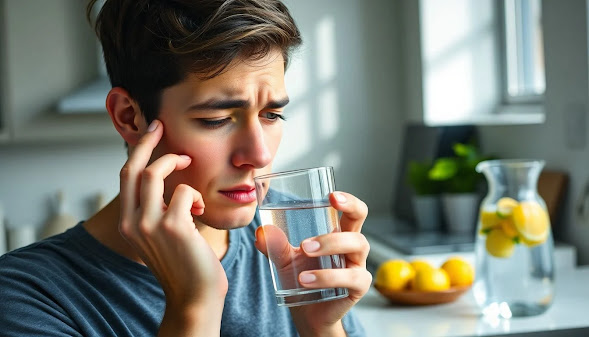Are You Really Drinking Enough Water? Signs You’re Dehydrated
Introduction
Water is the foundation of life. It keeps us healthy, energized, and functioning well. Yet, many people often forget how crucial staying hydrated really is. Drinking enough water is more than just quenching thirst — it affects everything from your mood to your focus. Sadly, dehydration happens more often than we realize because most signs sneak up on us. Recognizing the early symptoms can help prevent serious health issues down the line. Are you aware of your body's dehydration signals? It might be time to pay attention.
Why Proper Hydration Matters for Your Health
The Role of Water in the Body
Water is essential for almost every function in your body. It helps regulate body temperature, making sure you don’t overheat or get too cold. Water also supports digestion by breaking down food and absorbing nutrients. It's key to keeping joints lubricated, so moving around stays smooth and pain-free.
Health experts recommend about 8 glasses (roughly 2 liters) of water daily for most adults. Children, seniors, athletes, and pregnant women often need more or less, depending on their activity and health status. Proper hydration isn’t just recommended — it’s vital.
Consequences of Chronic Dehydration
When you don’t drink enough regularly, it leads to dehydration. Long-term dehydration can cause kidney stones or urinary tract infections. Cognitive functions like concentration and memory suffer too. Studies show dehydration impairs physical endurance and mental sharpness. If ignored, chronic dehydration may elevate health risks, including poor skin health and increased illness vulnerability.
The Connection Between Hydration and Overall Well-being
Staying well-hydrated boosts your energy and mood. Have you ever felt sluggish at work or cranky? Drinking enough water might be the simple fix. Proper hydration can speed up recovery after illness or intense workouts. Plus, it keeps your skin soft, elastic, and vibrant. When your body's hydrated, you feel more alert and positive — it’s like a natural mood booster.
Common Signs That You Might Be Dehydrated
Thirst and Dry Mouth
Thirst seems obvious, right? But it's actually a late sign. By then, your body is already signaling dehydration. A dry mouth or sticky feeling on your tongue could be early clues. Pay attention, so you don’t wait until you’re parched to hydrate.
Dark Urine and Urgency
Check your pee color. Darker urine usually means you're dehydrated. Clear or light-yellow urine indicates good hydration. If you notice frequent urges to pee but still dark, it’s time to drink more water. Keep in mind, certain foods and drinks can influence urine color too.
Headaches and Fatigue
Dehydration can cause headaches that feel dull or sharp. You might also notice tiredness that hits unexpectedly. If you’re feeling sluggish but slept well, consider if dehydration could be the cause. Water helps prevent these common discomforts.
Dry Skin and Dizziness
Dehydrated skin loses its elasticity, becoming dry and flaky. Feeling dizzy or lightheaded, especially when standing up quickly, can also point to low fluid levels. Athletes and seniors are more vulnerable to this symptom. It’s a clear sign your body needs water.
Less Obvious Symptoms
Sometimes, dehydration shows up in sneaky ways:
- Muscle cramps during exercise
- Irregular heartbeat or palpitations
- Constipation, or decreased urinary output
These symptoms often get overlooked but are warning signs your hydration levels are off.
Factors That Influence Your Hydration Needs
Age and Body Size
Kids and older adults have different hydration needs. Children’s bodies contain more water compared to their size, and seniors’ thirst sensation weakens with age. Larger bodies require more water to stay balanced. Knowing your age and size helps you adjust daily intake.
Physical Activity and Climate
Exercise raises your fluid requirements. Sweating during workouts or outdoor activities means losing water fast. Hot, humid weather makes you sweat more too. Athletes and outdoor workers should hydrate before, during, and after activity.
Health Conditions and Medications
Certain health issues like diabetes or kidney problems boost dehydration risk. Some medicines, especially diuretics and antidepressants, cause increased fluid loss. Management involves extra water intake and medical advice.
Dietary Factors
High-protein, salty, or fibrous foods demand more water for digestion. Also, caffeine and alcohol have diuretic effects, making you urinate more. Moderation helps maintain your overall hydration level.
Practical Tips to Ensure You're Drinking Enough Water
Setting Daily Intake Goals
Every person is different. Use your age, activity level, and environment to set a personalized water goal. Track your intake with apps or a simple water journal. Consistency is key for staying properly hydrated.
Incorporating Hydrating Foods
Fruits like watermelon, oranges, and strawberries are bursting with water. Vegetables like cucumbers, lettuce, and celery also boost hydration. Drinking smoothies and hot or cold soups adds fluids in tasty ways.
Establishing Reminders and Rituals
Set alarms or use apps to remind you to drink. Make it part of your daily routine: sip water after waking up, with meals, and before bed. Keeping a water bottle nearby encourages regular sipping.
Recognizing and Responding to Dehydration Signs
Listen to your body. If you notice dry lips, dark urine, or fatigue, drink some water immediately. Severe symptoms like dizziness or confusion require prompt medical attention. Staying vigilant helps prevent dehydration from worsening.
Conclusion
Water is the fuel your body needs to run smoothly. Thirst isn’t always a reliable warning, so knowing the signs of dehydration is crucial. Even slight drops in hydration can affect your mood, energy, and skin. Make a habit of drinking enough water daily, adjusting for activity and weather. Regularly check in with your body's signals and stay ahead of dehydration. Remember, staying hydrated isn’t just about quenching thirst — it’s about feeling your best every day. Make hydration a priority for better health and a more vibrant life.






1 Comments
Got It
ReplyDelete